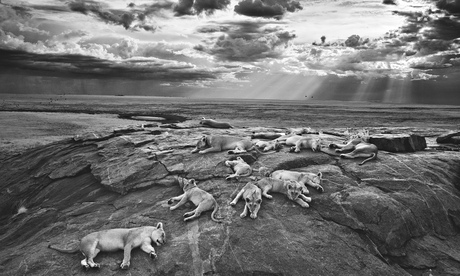
We live in an era defined by extinctions, as Elizabeth Kolbert reveals in The Sixth Extinction: An Unnatural History (Bloomsbury £20). “One-third of all reef-building corals, a third of all fresh-water molluscs, a third of sharks and rays, a quarter of all mammals, a fifth of all reptiles, and a sixth of all birds are now headed toward oblivion,” she states in her superb history of Earth’s disappearing life forms.
Nor is it hard to pinpoint the culprit. The blame lies squarely with humans, who are dynamiting coral reefs, ploughing up swaths of the Amazon basin for farming and spreading fungal diseases that threaten every bat species in America and every amphibian species on the planet. When it comes to sharing a planet, we are the neighbours from hell. Indeed, so widespread and pernicious is our influence that we are now generating an extinction event that promises to rival the one that did for the dinosaurs 66m years ago or the Permian-Triassic extinction, 252m years ago, which wiped out 70% of all vertebrate species.
The Sixth Extinction is as much travelogue as history, however, and takes us on a journey to central Panama in a futile hunt for golden frogs and other lost amphibians; to the Icelandic island of Eldey, where the last great auk, a flightless bird once common in the northern hemisphere, was strangled by egg collectors in June 1844; and to Australia’s One Tree Island, where scientists are studying the decline of coral reefs, which, later this century, are likely to be the first complete ecosystem to be wiped from the planet.
It is a sad story. Yet it is told with such verve and wit by Kolbert that it is impossible to put down once started. By a clear margin, this was the best science book I read this year.
Yuval Noah Harari’s Sapiens: A Brief History of Humankind (Harvill Secker £25) also displays considerable breadth of vision and polished prose. Harari, a historian at the Hebrew University of Jerusalem, follows the rise of modern humans and relates how our species ended up in its current position of global dominance.
Many of Harari’s observations are acute – “the historical record makes Homo sapiens look like an ecological serial killer,” he notes in one observation that echoes Kolbert’s work – and his writing has elegance and humour.
His approach has a little too much of the magpie, however, and too many bright, shiny ideas are accepted without proper questioning. For example, he is at odds with many palaeontologists in believing in the idea of the Great Leap Forward (or Cognitive Revolution, as he calls it), which is said have to transformed our species intellectually between 30,000 to 70,000 years ago, turning brute cavemen into super-smart foragers. Most scientists believe our intellectual evolution was a much older, more complex and gradual business than Harari argues. Sapiens is an intriguing book, nevertheless.
By contrast, Walter Isaacson, already noted for his fine biographies of Albert Einstein and Steve Jobs, has produced a book, The Innovators (Simon & Schuster £20), which is very much a work for the 21st century and tells the stories of the pioneers of the digital revolution, ranging from Alan Turing to Bill Gates and from John von Neumann to Tim Berners-Lee. Again, the writing is first class.
And finally, a regular favourite in my household: this year’s Wildlife Photographer of the Year book (Natural History Museum £25), its images selected from the annual exhibition of the same name that is held at London’s Natural History Museum and which is now in its 50th wonderful year. The richly detailed, glorious images give us an unsurpassed vision of our planet’s wildlife – and indication of what we are now at risk of losing.

